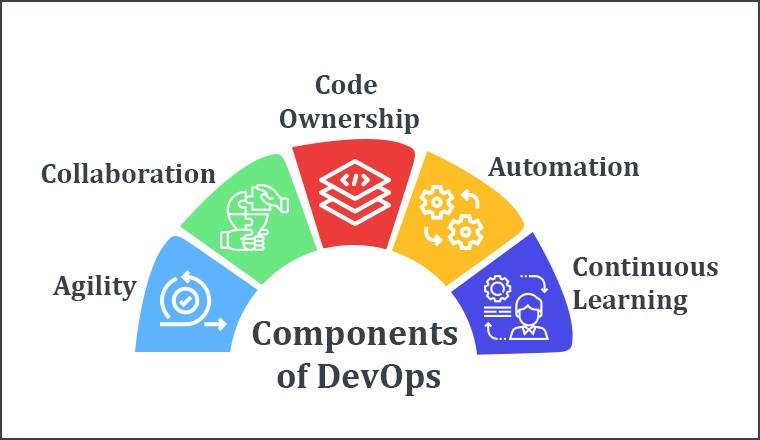In today’s fast-paced digital age, businesses seek new ways to stay ahead of the competition. One approach that has gained tremendous popularity in recent years is Enterprise DevOps – a collaborative methodology that merges software development and operations teams to increase efficiency and streamline processes. We have a complete guide on enterprise DevOps, where you can understand why an enterprise needs a DevOps strategy.
DevOps has become a buzzword in the tech industry, with more and more enterprises adopting this approach to stay agile and competitive in the market. This article will explore why every enterprise needs a DevOps strategy and how it can help your organization achieve its goals. Let’s explore more about DevOps strategies in the further article.
Enterprise DevOps- A brief introduction
Enterprise DevOps is a technology that focuses on improving the Quality and speed of software delivery in huge organizations. It integrates development, operations, and other relevant teams to get together and automate processes throughout the software development life cycle (SDLC). The concluding goal of Enterprise DevOps is to provide software faster and with good Quality while decreasing the risks and costs associated with traditional software development.

One of the key benefits of Enterprise DevOps is that it increases communication and collaboration with the teams. By breaking down silos between operations and development, teams can work efficiently and effectively, which results in faster time-to-market and maximum customer satisfaction.
It also emphasizes (CI/CD) continuous integration and delivery, which helps organizations supply new features and updates to their software more timely and reliably.
Another essential aspect of Enterprise DevOps is the automation feature. By automating monitoring, testing, and deployment processes, businesses can reduce errors and provide consistent Quality throughout the SDLC.
This not only saves time but improves the overall Quality of the software being delivered. Furthermore, automation helps businesses to scale more efficiently, as it minimizes the amount of manual work needed to manage large-scale software deployments.
Overall, Enterprise DevOps is an approach that helps organizations to deliver high-quality software at a faster pace while minimizing risks and costs. By promoting collaboration, breaking down silos, and emphasizing automation, enterprises can enhance their software development processes and stay competitive in today’s fast-paced digital age.
4 Reasons Why Every Enterprise Needs A DevOps Strategy
Here are four main reasons why enterprises require DevOps strategies:
Improved Collaboration
Improved collaboration is a crucial advantage of implementing a DevOps strategy within an enterprise. DevOps increases collaboration and communication between the development and operation teams by breaking down hurdles and creating a shared responsibility. This collaboration leads to better alignment and understanding of goals, faster decision-making, and more efficient processes.
In traditional businesses, development and operations teams repeatedly work in isolation from each other; this results in the need for more communication and understanding of each other’s constraints and requirements. This can lead to delays, errors, and, ultimately, a suboptimal end product. DevOps breaks down these barriers and creates a culture of collaboration, where developers and operations teams work together towards a common goal.
Faster Time-to-Market advantage
Faster time-to-market is also an important benefit of executing a DevOps strategy within an enterprise. DevOps helps enterprises to deploy software and services faster and more frequently, allowing them to quickly acknowledge customer needs, market changes, and emerging technologies.
DevOps achieves faster time-to-market by using a number of critical practices, including continuous delivery, continuous deployment, and continuous integration:
- Continuous delivery is made on the basis of constant integration by automating the deployment of code changes to production environments. This means that software can be released to production quickly and frequently, reducing the time required to get new features and updates into the hands of customers.
- Continuous distribution takes this one step further by automating the release of code changes to production environments. This means that code changes are automatically released to production as soon as they are ready, without the need for manual intervention.
- Continuous integration involves automating the build and testing of code changes, which helps to identify and fix issues early in the development process. This ensures that code is always in a releasable state, reducing the time required to prepare for a release.
Greater Agility
While faster time-to-market is one situation of greater agility, there are a few more ways that DevOps can help enterprises to be more agile.
For instance, DevOps promotes a culture of continuous improvement, where members are encouraged to work on and test new approaches and ideas. This allows organizations to quickly adapt to new technologies and market trends and take advantage of emerging opportunities.
This technology also helps enterprises respond to customer and stakeholder feedback. Through continuous monitoring and testing, businesses can quickly identify and respond to issues or concerns from end users or stakeholders, improving customer satisfaction and brand reputation.
Additionally, DevOps helps enterprises to be more adaptable and flexible in their approach to development. By breaking down silos and integrating development and operations teams, enterprises can quickly pivot their development efforts in response to changing business needs, market conditions, or emerging technologies.
By providing these additional benefits, DevOps enables enterprises to be more agile and responsive, helping them to stay ahead of the competition and drive business growth.
Improved Quality of business projects
Improved Quality is also essential to implementing a DevOps strategy within an enterprise. DevOps has improved Quality through different key practices, automated testing, including continuous testing, and enhanced collaboration of development and operations teams.
By implementing continuous examination, DevOps ensures that code is tested in-depth and consistently throughout development. This minimizes the risk of bugs and other issues appearing in the production, leading to a higher-quality end product.
Automated testing enhances the Quality of software by decreasing the risk of human error and also enabling developers to test their code more quickly and consistently. This helps issues to be identified and resolved more quickly, that reduces the time required to make a release and improves the Quality of the final product.
In addition to improving the Quality of the end product, this feature also leads to a productive and efficient work environment. By minimizing the time needed for testing and fixing issues, team members can focus on developing and improving new features. This leads to a higher-quality end product more responsive to customer needs and market trends.
By providing these benefits, DevOps enables enterprises to deliver high-quality software and services that meet the needs of their customers, driving customer satisfaction and business growth.
In conclusion, a DevOps strategy provides a range of advantages for enterprises of all sizes, like improved collaboration, faster time-to-market, greater agility, improved Quality, etc. These benefits enable the team to deliver high-quality software and services that meet the needs of their customers, improve competitiveness, and drive business growth. As such, every enterprise should consider implementing a DevOps strategy to stay ahead of the competition and ensure long-term success.









